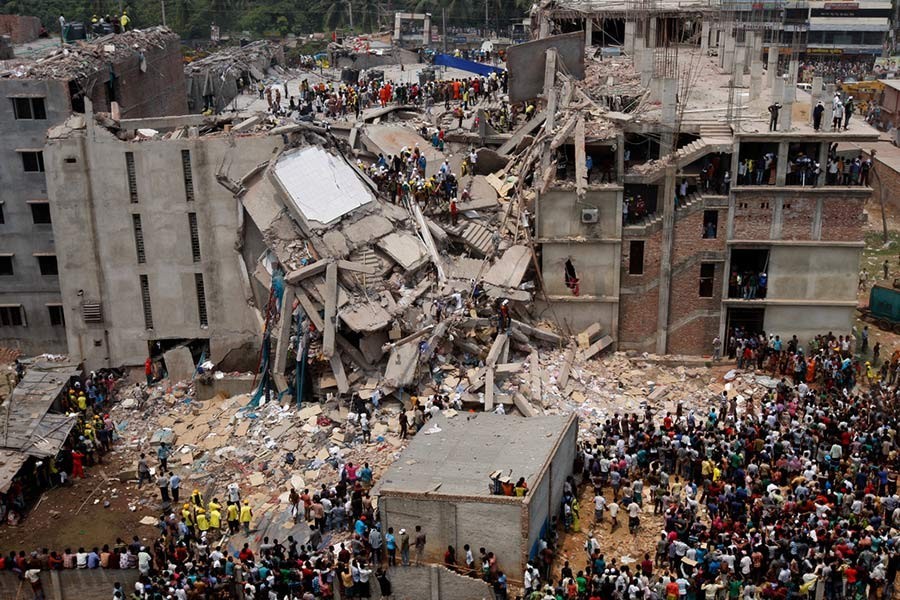
Published :
Updated :

Nearly 57 per cent of the survivors of Rana Plaza are unemployed, according to a survey.
Besides, 43 per cent of the other survivors have to make living by changing their work from time to time due to deteriorating physical condition.
Rana Plaza is the deadliest industrial disaster in Bangladesh that left more than 1,100 people, mostly RMG workers, dead in 2013.
According to the survey conducted by ActionAid Bangladesh, the physical health condition of 14 per cent survivor is getting worse.
Among them, 58.5 per cent are more or less stable, and 27.5 per cent are completely stable. Most of the 14 per cent survivors reported that they are still bearing headache, pain in hand and leg and back pain.
In terms of psychosocial health, 12.5 per cent are still in trauma in comparison to 10.5 per cent survivors last year. Currently 62 per cent reported that they are more or less stable, and 25.5 per cent have recovered fully compared to 21 per cent last year.
A total of 4.5 per cent more survivors have improved their mental health than last year.
These findings were disclosed at a virtual dialogue titled 'COVID-19: Challenges for the Rana Plaza Tragedy Survivors' on Thursday organised by ActionAid Bangladesh in memory of the 8th year of Rana Plaza tragedy. The survey was conducted among 200 survivors of Rana Plaza collapse.
According to the survey, 43 per cent survivors are engaged in various types of wage and self-employment. However, due to the deteriorating physical condition, they have to make a living by changing their work from time to time. The 12 per cent survivors have returned to garments with another 12 per cent involved in tailoring.
In most households, there is only a single earner whose income is reduced due to the outbreak of COVID-19. A total of 37.5 per cent said their household income is between Tk 5,001 to 10,300 while 29.5 per cent have a household income between Tk 10,300 to 15,300.
Majority of survivors have an average expenditure of over Tk 10,000 with major costs incurred for food, followed by house-rent, children's education and treatment.
Around 67 per cent participants said that the factories are maintaining the guided procedures when they enter into and stay during the working hour while 33 per cent participants expressed that the factories are not offering guided measurements in rolling out safe health and hygiene at the workplace.
Member of Parliament Shirin Akhter stated that, "We have labour laws in our country. If that law is implemented properly, it is possible to gain some benefits to the workers. As well as compensation laws needs to be enacted. Creating an emergency fund makes it easier to get temporary relief from dangers like the Rana Plaza tragedy."
She said trade unions, employers and the government can work together to create a good working environment, transparency, and accountability in the factories. "If we can confirm all these things, we can say that we've been able to bring positive changes by learning from the horrors of the Rana Plaza incident," she also added.
Shirin Akhter called on the trade unions to negotiate with the RMG owners to see if the incentive announced by the government during COVID-19 is properly allotted to the workers. She also requested the employers to arrange rations for the workers.
Country Director of ActionAid Bangladesh s Farah Kabir moderated the function. She said even in eight years, the condition of significant surviving workers is not satisfactory. But the workers are called the oxygen of the economy and development of the country.
"We've to come out of the colonial mentality and fulfil the just demands of the workers. Accidents could happen again at any time like Rana Plaza collapse. That is why everyone should be made aware about insurance schemes, self-development skills or special fund formation and emergency activities," she added.
The Country Director of ILO Country Office for Bangladesh Tuomo Poutiainen said there is a requirement to improve security and governance on labour issues, and this needs institutional change. "We've to create a culture of health safety for workers in factories and the government needs to enact legislation to ensure this.'
He called for a new way of thinking about social security during COVID-19. And for that Tuomo Poutiainen spoke of creating new jobs by increasing investment in collaboration with the government, industry and workers.
Research Director of Center for Policy Dialogue (CPD) Dr Khondokar Golam Moazzem said since the Rana Plaza collapse, there has been no positive change in the victims' lives. Despite some financial assistance, the process of reintegration of injured workers in the formal sector has not been introduced; they have to be brought under reintegration process.
He called for the distribution of free health cards from the Rana Plaza Trust Fund at the upazila level to ensure the medical treatment of the injured workers who have returned to their village homes. He also proposed for the provision of health insurance for the surviving injured workers.
Dr Hameeda Hossain, Convener, Sramik Nirapotta Forum (SNF) called for ensuring the safety of workers by implementing safety committees and insurance schemes.
General Secretary of Somajtantrik Sramik Front Rajekuzzaman Ratan said on an average, about 1,000 workers die in various accidents in our country every year. The National Social Security Project needs to be implemented to ensure security. People should not lose their lives.


 For all latest news, follow The Financial Express Google News channel.
For all latest news, follow The Financial Express Google News channel.